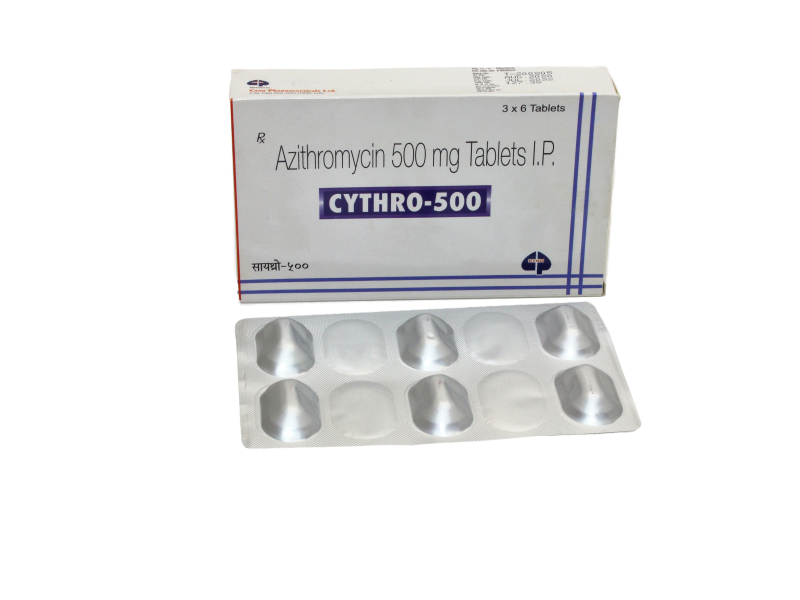CYTHRO 500
Azithromycin (500 mg)
Cythro 500mg Tablet is an antibiotic medicine. It is used to treat many different infections caused by bacteria. These include infection of the blood, brain, lungs, bones, joints, urinary tract, stomach, and intestines. It is also treating sexually transmitted diseases. It stops the growth of the bacteria causing the infection and clears the infection. Take it for as long as prescribed by the doctor and avoid skipping doses. It is to make sure that all bacteria are killing and they do not become resistant.
Azithromycin is an antibiotic. It treats chest infections such as pneumonia, nasal and throat infections such as sinus infections (sinusitis), skin infections, Lyme disease, and few sexually transmitted infections.

Mechanism of Action:
Macrolides inhibit protein synthesis. They specifically impair the elongation cycle of the peptidyl chain by binding to the 50S subunit of the ribosome, thus preventing the translation of mRNA. Azithromycin prevents bacteria from growing by interfering with their protein synthesis. Nucleic acid synthesis is not affected.
Pharmacodynamics:
Macrolides produce time-dependent killing.
Shelf life:
3 years
Half-life: 35-40 hours.
Monitoring Requirements:
Therapeutic: Periodic WBC, chest X-ray if pneumonia, cultures, temperature
Pharmacokinetic Properties:
Azithromycin is an acid-stable antibiotic, so it can be taken orally without the need for protection from gastric acid. It is easily absorbed, but absorption is higher on an empty stomach. Peak concentration (Tmax) time in adults is 2.1 to 3.2 hours for oral doses. Due to its high concentration in phagocytes, azithromycin is actively transported to the site of infection. During active phagocytosis, large concentrations are precipitated. Azithromycin concentration in tissues can be up to 50 times higher than in plasma due to ion trapping and its high lipid solubility (distribution volume is very high). The half-life of azithromycin allows a large single dose to be administered and still maintain bacteriostatic levels in infected tissue for several days.
Drug-Drug interactions:
Due to its liver metabolism, caution should be exercised when administering this agent with other drugs metabolized in the liver. The following drug interactions are clinically relevant but do not represent a comprehensive list of documented or potential drug–drug interactions.
Precautions:
Even when you start feeling better, you must take a full course of antibiotics.
Do not take antibiotics without a prescription. Not all antibiotics can cure all bacteria. Do not share antibiotics. Do not take antibiotics on a different dosage schedule than prescribed by a doctor. Call a doctor immediately if side effects develop.
Go to the emergency room for symptoms of an allergic reaction, such as trouble breathing.
Breastfeeding:
Azithromycin has been reported to be secreted in human breast milk, but there are not sufficient and well-controlled clinical studies in lactating women that characterize the pharmacokinetics of azithromycin excretion in human breast milk.
Fertility:
In a fertility study conducted in rats, a decrease in the pregnancy rate after the administration of azithromycin was reported. The relevance of this discovery to humans is unknown.
Dosage:
Azithromycin Tablets should be given as a single daily dose. The tablets may be taken with food.
Duration of action:
Azithromycin is an acid-stable antibiotic, so it can be taken orally without the need for protection from gastric acid. It is easily absorbed, but absorption is higher on an empty stomach. Peak concentration (Tmax) time in adults is 2.1 to 3.2 hours for oral doses.
Adverse Reaction:
Gastrointestinal: stomach cramps, nausea, diarrhea, anorexia, pancreatitis
Pedigree: vulvovaginal candidiasis, renal failure
Cardiovascular system: prolonging the QT interval
Hepatic: hepatotoxicity, jaundice
Hematoma: eosinophilia, thrombocytosis, lymphopenia
Central Nervous System: Headache, Fatigue
Endocrine / Metabolic: Hyperglycemia
Dermatologic: itching, nail discoloration
Storage:
Special precautions for storage
Do not store above 25°C.
Overdosage:
In the event of an overdose, common symptomatic and supportive measures are indicated as needed.
Contraindictions:
Contraindicated: Coadministration with astemizole, cisapride, ergotamine, terfenadine
Warnings:
People who have myasthenia gravis, a condition that causes muscle weakness, may have worsening symptoms or breathing problems.
People with a history of allergy to macrolides or ketolides should not take azithromycin.
Pregnancy:
No evidence of risk in humans but studies inadequate.
